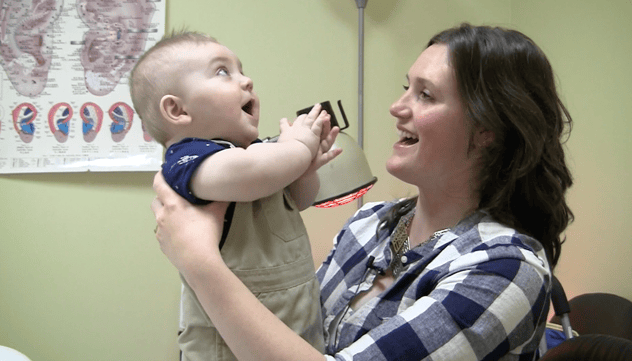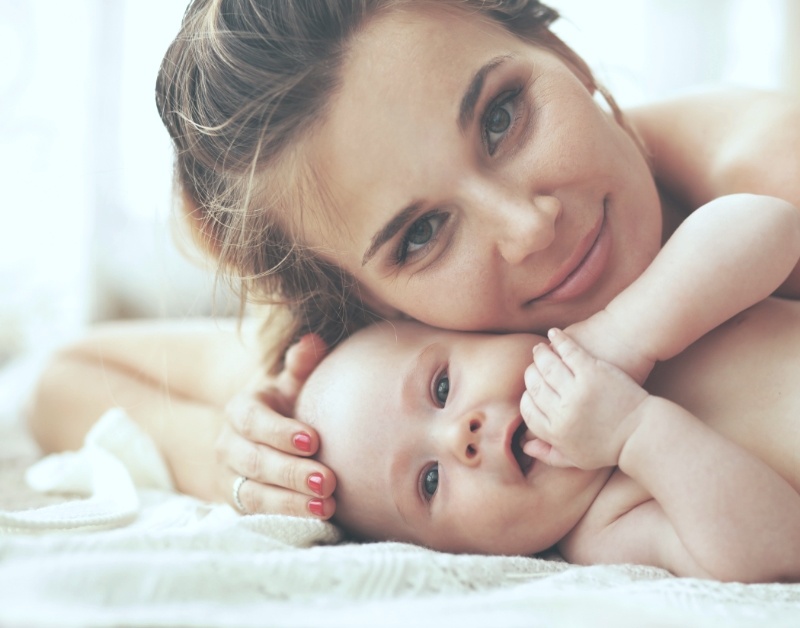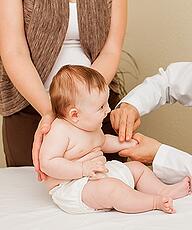
In Mandarin, there is a character pronounced “de" 得. It's a neutral tone, and it's typically translated as "virtue". There's nothing particularly wrong with this translation, but something that people don't know is that it's part of a grammatical structure that indicates how you do something. While adverbs are optional in English, in Mandarin Chinese, you never miss a verb complement or this "de"-structure to indicate how you do what you do. This is an important aspect of our medicine we often miss. Deeply rooted in the culture behind our medicine is the emphasis on how we approach the things we do in our lives.
I became a mother in June of 2015, and leading to that point, I would rub my bump everyday, especially when I could feel where Logan was and say, "I love you, but you should know, I have no idea what I'm doing. Please, be sturdy." Everyday, "Dear baby, I love you. I have no idea what I'm doing. Please, please, please, be sturdy." Logan was born, after 25 hours of labor, in the 99th percentile for height, weight, and head size. He also had an infection, shoulder dystocia, a ring of hematomas around his crown, and required a cpap machine and pharmaceutical intervention to help his lungs absorb oxygen due to the prolonged compression of his chest.
On our fourth day in the NICU, my husband and I left to get dinner and received a call. Logan was having focal seizures localized to his right arm and leg, and they would need to do an immediate CT scan to look for the cause. We arrived as they received the results, and our neonatologist told us that our son suffered a stroke. His CT scan looked like his left sensory motor cortex hadn't develop at all. However, an MRA and MRI showed that his brain developed perfectly and, most likely, the injury occurred during my delivery. The neonatologist and the neurologist also told us that we could expect Logan to start showing symptoms as early as eight or nine months. I thought, "Thank God, I have time to research."
At four and a half months, I noticed that Logan always had his right arm forward at tummy time. I always just thought it was cute until I realized it was because he wasn't putting weight on his right arm. I thought I had time, but he already quit using his right arm, which never left a fist. I immediately took him to see Dr. Song Luo at AOMA acupuncture clinic. After one treatment, Logan slept with his hand open for the first time ever. After a few days and a follow up treatment, I was holding Logan and felt this slimy sensation on my cheeks. After the initial thought of how much drool was covering Logan's hands, I realized he was grabbing my face with both hands!
Regular, local treatments have kept Logan's development on track. Even when he started to show weakness in his right leg, just two points on the stomach channel followed by massage led to him crawling forward for the first time. I talk to parents around the country caring for children who have suffered from strokes and hemiplegia, and without acupuncture, many of these children grow up not being able to use their arm and often unable to walk unassisted. Dr. Luo tells me that Logan's experience is not uncommon. To see these children who aren't recovering and to know that acupuncture is so effective even with just three points and without needle retention is unacceptable to me.
Dr. Luo once shared a story about his great grandfather who taught him TCM. He was in his nineties and without hesitation, got up and got dressed in the middle of the night to help a patient in need. Dr. Luo said he taught him to practice medicine from the bottom of his heart, and it is this complete and utter compassion with which he approaches medicine that I feel makes him Logan's favorite doctor. His compassion and dedication combined with Logan's recovery have inspired me to dedicate myself even more in my studies in hopes of becoming a better acupuncturist when I graduate. These days, I don't generally ask the universe to keep Logan sturdy anymore. I know acupuncture has him covered. I just try to approach medicine and motherhood from the bottom of my heart.
Schedule an appointment at the AOMA acupuncture clinics in Austin:
Learn more about the AOMA Master's Program in Acupuncture and Oriental Medicine:





 Pediatric massage is applied on specific points of various parts of the body, such as the face, abdomen, back and extremities depending on the disorders. Lotion can be used to protect the skin and ease the treatment. Each session lasts about 20 – 30 minutes. In most cases, the treatment should be given once a day or every other day. Since the pediatric tuina technique is very simple, parents are encouraged to learn and practice some of the major techniques, so they can repeat the treatments at home.
Pediatric massage is applied on specific points of various parts of the body, such as the face, abdomen, back and extremities depending on the disorders. Lotion can be used to protect the skin and ease the treatment. Each session lasts about 20 – 30 minutes. In most cases, the treatment should be given once a day or every other day. Since the pediatric tuina technique is very simple, parents are encouraged to learn and practice some of the major techniques, so they can repeat the treatments at home. 